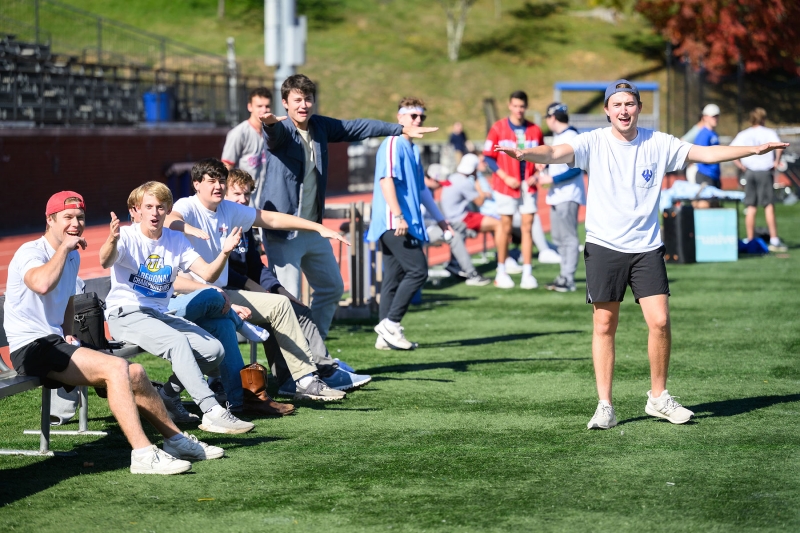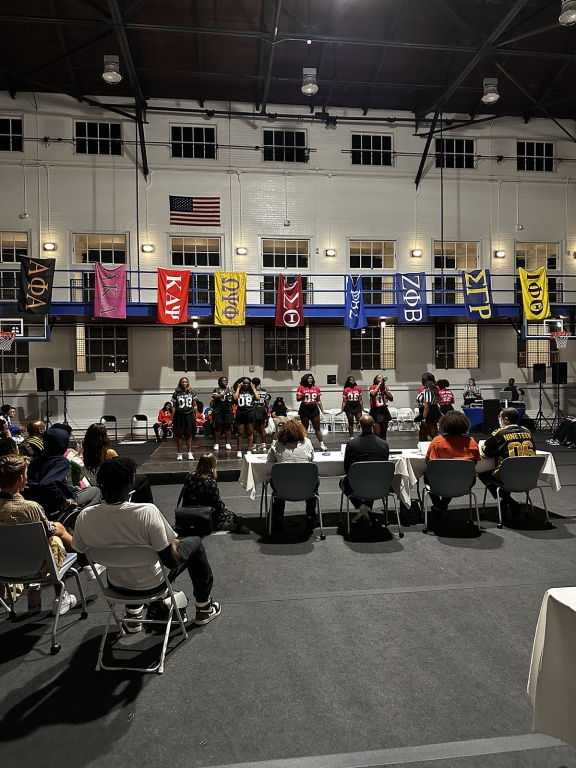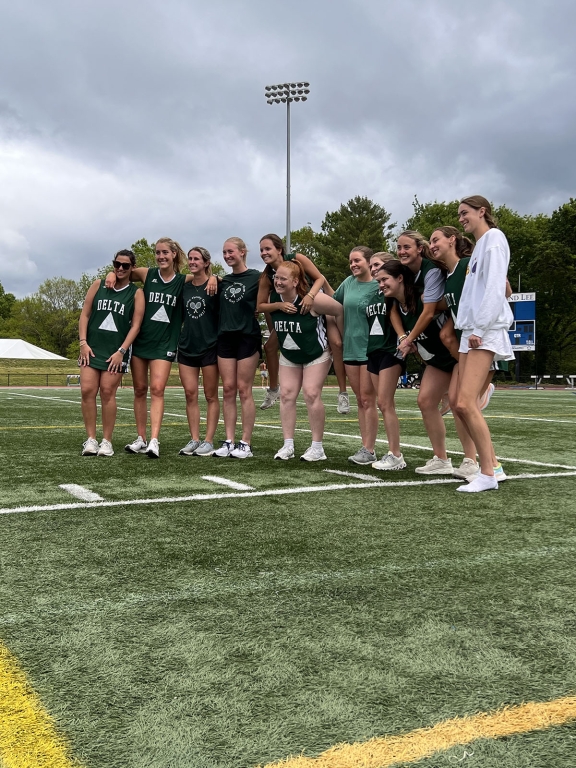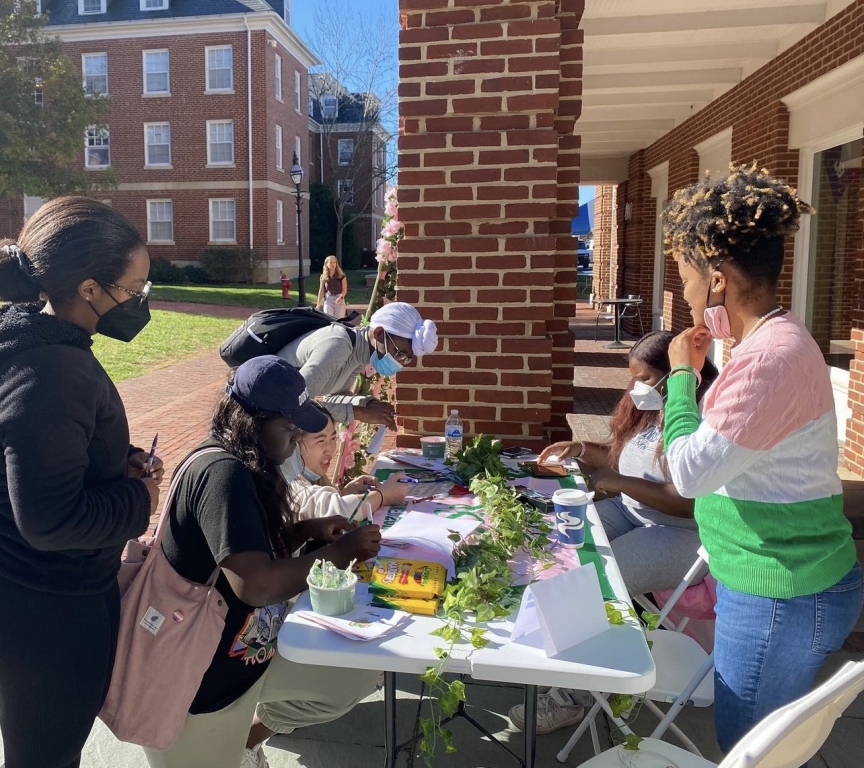Greek Councils Connect Campus Through Fun and Philanthropy Washington and Lee’s Interfraternity Council, National Panhellenic Conference and National Pan-Hellenic Council focus on community-building, education and fundraising throughout the year.
“Our three Greek councils work diligently to foster a sense of camaraderie and friendship within their respective Greek communities while also making a positive impact, whether it be through a service project or raising money for a good cause.”
~ Leah Beard, director of leadership development and student engagement
On a campus that prides itself on its cherished traditions, Washington and Lee University’s three Greek councils have found ways to create a calendar of much anticipated new events that focus on philanthropy, fun and collaboration between Greek chapters.
W&L has 11 national fraternities, nine of which are part of the Interfraternity Council (IFC). The remaining two fraternities are members of the National Pan-Hellenic Council (NPHC), which comprises W&L’s historically Black Greek organizations. The campus has eight sororities, five of which are part of the National Panhellenic Conference (NPC). Two sororities, Alpha Kappa Alpha Sorority, Inc. (AKA) and Delta Sigma Theta Sorority, Inc., are historically Black Greek organizations governed by the NPHC. One is a local organization.
Panhellenic Council’s annual kickball tournament, now in its second year, has become a staple of Spring Term. This year’s tournament supported Project Horizon. Panhellenic Council’s current chair of community engagement, Liv Ullman ’25, said that philanthropic events serve as an important way for chapters to connect over shared values.
“Our philanthropic events are also really great for fun and community building,” Ullman said. “I think one of the misconceptions that can arise around Greek life on any campus is just that everyone is in their own corners, and you aren’t interacting with anyone outside your chapters. It’s good to dispel that myth.”
NPC chapters have collaborated on clothing drives in recent years to help provide potential new members on campus with professional and special event attire to wear throughout the recruitment process, which Ullman explained reduces the financial barriers to participation. The council also plans to create end-of-semester gift bags for first-year students leaving for winter break who are participating in sorority recruitment, a new initiative to make first-year students feel welcome that the council hopes will become a staple of the recruitment cycle.
IFC spent the weeks leading up to its annual campus wiffleball tournament in October selling T-shirts and taking donations at tables outside Elrod Commons. Nine chapters participated in this friendly competition, which drew spectators from across campus. This year, IFC donated funds from the event to the Rockbridge SPCA. Last year’s recipient was the Rockbridge Public Schools Foundation, a 501(c)3 organization whose mission is to provide grant funding for Rockbridge County public school programming and initiatives. John Wallace ’25, IFC’s vice president of programming, said he is proud of IFC’s commitment to supporting philanthropic causes in the local community.
“We constantly look at ways to improve our philanthropy work,” Wallace said.
W&L’s Tau Zeta Chapter of AKA has offered opportunities throughout the year for students to contribute to a variety of philanthropic causes, from hosting a Zumba class to raise money for hurricane recovery in Puerto Rico to fundraising for numerous local nonprofits through its annual candy-gram initiative around Valentine’s Day. The chapter recently offered a make-up tutorial event on campus for students that included the opportunity to have professional photos taken at no cost for their resumes and LinkedIn profiles. W&L’s NPHC collaborated on a recent step show competition, inviting NPHC chapters from nearby schools to participate. The event provided an opportunity for the campus and local community to experience a unique aspect of historically Black fraternity and sorority life.
“There is a history behind stepping, and many students may not have had the chance to see that in action,” said Tamara Futrell, dean for diversity, inclusion and student engagement. “Many children from the community also come to the step shows when we have hosted them on campus, so it educates the surrounding community about that tradition as well.”
Leah Beard, director of leadership development and student engagement, said all three councils are passionate about collaboration.
“Our three Greek councils work diligently to foster a sense of camaraderie and friendship within their respective Greek communities while also making a positive impact, whether it be through a service project or raising money for a good cause,” Beard said. “They have also collaborated effectively to educate students about the Greek system at W&L through various information sessions as well as a Meet the Greeks Fair that occurs at the beginning of every academic year.” This event invites students to meet members of each Greek organization represented on campus and learn more about how to get involved. Council leadership also participates in the university’s annual Greek Leadership Institute, which occurs in early January and provides leadership development for new chapter and council leaders.
“Our Greek councils, and our Greek organizations more broadly, offer opportunities for our students to develop their leadership and other critical skill sets, which translate to their academics and other extracurriculars,” Beard said. “Students are being prepared for lifelong leadership as a result of engaging in the Greek community.”
 The crowd goes wild at IFC’s wiffleball tournament on October 21.
The crowd goes wild at IFC’s wiffleball tournament on October 21. NPHC’s step show competition on October 29
NPHC’s step show competition on October 29 Panhellenic’s spring kickball tournament brings together sorority women for a charitable cause.
Panhellenic’s spring kickball tournament brings together sorority women for a charitable cause. AKA’s tabling outside Elrod Commons to write thank-you letters for healthcare workers in the Student Health Center and Carilion.
AKA’s tabling outside Elrod Commons to write thank-you letters for healthcare workers in the Student Health Center and Carilion.
You must be logged in to post a comment.